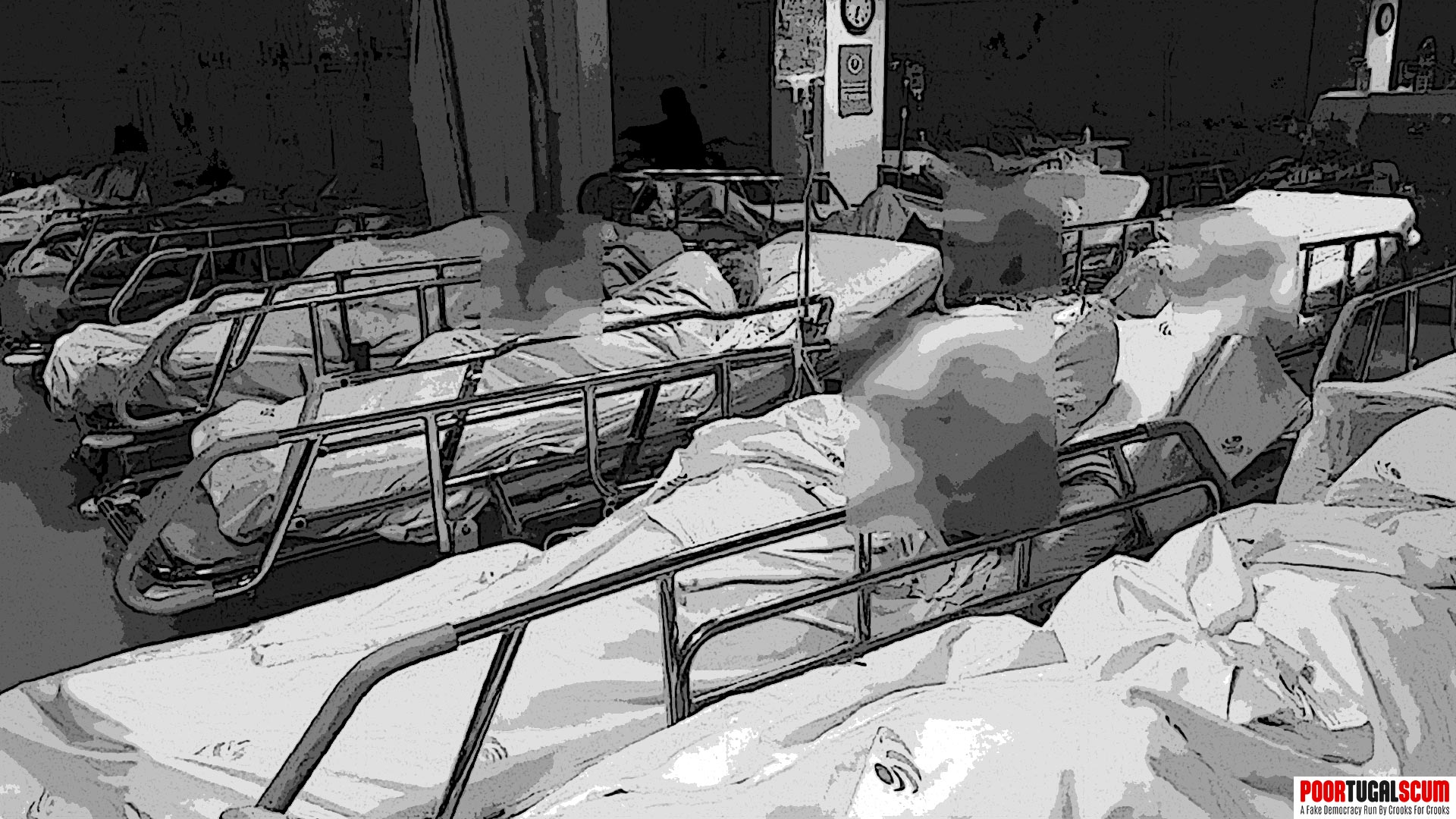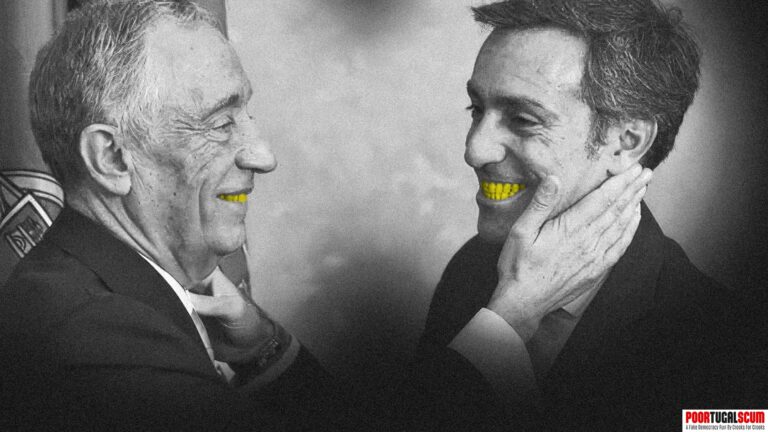I emphasize that there are good professionals who really care about patients in Portuguese hospitals and that you can often be well taken care of. The problem is that the likelihood of being seriously mistreated, even to the point of endangering your life, is criminally high.
This shocking news is a very good report of how most public hospitals in Portugal work, with more or less seriousness. It is very frightening to know that a patient who goes to a Portuguese hospital in search of help actually runs the risk of leaving in a worse state of health than when he/she entered, or even of suffering a very common “accidental” death, for which there is never a responsible or culpable party, and also because many Portuguese doctors believe they are above reproach.
Another frightening conclusion that we can draw from this is that the forces of evil and mediocrity are always in great majority in Portugal, and for this reason they shamefully triumph over the good and righteous people. These two doctors of great integrity, and for me enormous heroes, are definitely all alone, Portugal does not deserve them, nor do they deserve to be treated like this by this scum, who are only concerned with hiding the crimes of gross malpractice that they commit, probably every day that they perform.
Most likely and most certainly, this young lady of great integrity will suffer devastating reprisals in her professional life. I really wish and sincerely hope that this will not be the case, but this is Portugal we are talking about.
It is also very important to mention that any alleged intervention by the judicial authorities, the medical order and the hospital management itself, where these terrible crimes are regularly committed with TOTAL impunity, only serves to throw dust in the eyes of the Portuguese who have become aware of this situation, but unfortunately, deep down, most of them don’t care less either. In the end, and after many years, the result is that no one is held accountable and no patient victim is compensated, or at best, there are no effective consequences. Like the gentleman who was “accidentally” castrated (!!!) Welcome to Portugal! You can even get castrated for free!
In fact, the Portuguese Medical Order archived (rejected) the complaint, even in the face of autopsy evidence consistent with medical error.
These truly horrific and criminal situations for human beings, which we see here being described and treated as banalities by the Portuguese involved, are exactly the equivalent of what happens in the Portuguese justice system, as well as in all other very important areas of the functioning of any democratic country.
This is Portuguese society in a nutshell, this is the callous medieval mentality of the majority of the Portuguese population in action, completely contrary to what a truly developed and democratic country is.
It should be noted that this hospital serves the entire tourist area of the Algarve. Imagine the anguish if you, as a tourist, had to be urgently admitted to this hospital of terror? Just run for your life!
The following article is a translation (mostly MT). You can find the link to the original website at the end of it.
Diana Carvalho Pereira says that she received more complaints from colleagues, from different services. She intends to forward everything to the Judiciary. Hospital anesthetist says “Diana only sins by default”.
More allegations and more evidence. Diana Carvalho Pereira, the intern who reported cases of negligence at Hospital de Faro, continues to gather information. As she advanced this Wednesday, live on Instagram, since she drew attention to alleged bad practices in Faro — and filed a complaint with the Judiciary Police — she has heard many stories from her colleagues, including from services different from hers. At the same time, on Facebook, an anesthetist at the hospital, with more than 30 years in the profession, considers that Diana’s reports only sin “by default”.
“I was contacted by several professionals at the hospital. Some report horrible situations even in other services”, says the 27-year-old doctor. “It’s not a particular situation for this team, it’s for the service and perhaps the hospital”, adds Diana Carvalho Pereira, who had started the internship three months before making the allegations.
Thus, in addition to the 11 alleged cases of negligence and medical error that she has already presented to the PJ, the doctor promises to deliver more soon, as soon as she has gathered the necessary documentation. The Order of Physicians will also be notified of the alerts that have reached it.
The doctor also clarifies that she was not removed from the service, as was reported, but that it was she who asked for the suspension of her internship. However, assumes that she has suffered several retaliations — not detailing — since she filed a complaint with the PJ.
“Whether as an anesthesiologist or as a patient, I have seen and experienced unbelievable situations”
“I don’t know my colleague Diana Carvalho Pereira, although doctors at the same hospital, I find myself at the end of my career, betrayed by an oncological disease, she is starting her professional career.
But I know the Surgery Service of Hospital de Faro very well. I’ve known it since October 2012. I think Diana only sins by default.” The report is by doctor Rosina Andrade and is on her Facebook page.
“Whether as an anesthetist or as a patient, I have seen and experienced unbelievable situations. I reported several cases to the management bodies of the hospital. I didn’t have the courage to take Diana’s position. They didn’t try to label me as unbalanced, but as a “difficult person”, “conflictive” and with a “bad temper”.
I would have the best temper in the world if I didn’t give a sh*t about patients.
Not knowing Diana personally, I attest that she is not crazy”, adds the doctor.
In his opinion, anyone who works in Faro, particularly in the Operating Room, “knows that Diana is not crazy”, nor lying. “During 10 years I saw several surgical colleagues arrive, most from Coimbra, excellent in their knowledge and surgical techniques.
“One by one they left. For mediocrity to reign, followers have to be mediocre”,
accuses Rosina Andrade. “Diana opened a Pandora’s box. If pressure forces do not close it and if the investigations are serious, this case will reach unimaginable proportions.
“To the shame of those who always knew and did nothing”
More related news
Diana Pereira: “I’ve seen things that make me ashamed”, including an accidental castration
The intern doctor denounced a surgeon at the Centro Hospitalar Universitário do Algarve for repeated errors and negligence.
For a year and three months, Diana Carvalho Pereira has been an intern at the Centro Hospitalar Universitário do Algarve (CHUA). In January she began internship in surgery, a department where she encountered “a shocking reality”.
Now she accuses a surgeon on the team of committing successive medical errors and extends the accusation to the director of the service for alleged connivance. Three of the cases she witnessed may have led to the death of the patients.
In early April, the health professional, born in Porto, filed a complaint with the Judiciary Police and the case went to the Public Ministry. In view of the seriousness of the accusations, the hospital opened an internal investigation on an urgent basis. The clinical director also asked the Order of Doctors to intervene.
Chairman Carlos Cortes, assured in a press conference this Tuesday, April 11, that it is “a priority matter” and a commission will be created to speed up the investigation of the cases. “Given the specified seriousness of what was reported, it was important to have a swift intervention, on the one hand, and consequent, on the other, to ensure health care, as well as compliance with correct medical practices”.
The 27-year-old internist took to social media to expose the case, claiming that “a story of mental insanity was invented” to defame her. However, Diana Carvalho Pereira guarantees that she is in full possession of her psychic faculties, even having a medical certificate to prove it. NiT spoke with the professional to understand the contours of the situation.
When did you become aware of the cases you reported?
In early 2022 I did a three-month internship in surgery at Hospital de Faro, as part of a general training internship that includes periods in various services. At that time, I was integrated into a team that I believe had good practices. The experience was so positive that I ended up choosing surgery as a specialty. Meanwhile, I continued my general internship at the health center and asked to work overtime at the hospital in Faro. I wanted to earn some money and gain experience in the area I liked. At the time, there was a greater need in the team of the surgeon I reported, and I was scheduled to do emergencies on Tuesday nights with the professionals I reported. I quickly realized how they worked and I didn’t have a good experience. Four weeks later, I stopped working those extra hours because I was scared of working under those conditions. Contrary to what is supposed, she treated patients alone and performed small sutures, without supervision or help. In January, when I started surgical internship, I was surprisingly placed with this same team. I even considered whether I should continue the internship or not, because I believe it is something that requires a lot of dedication, with a great weight on my career. I decided to stay and it was during these months that the situations I denounced occurred.
Five patients suffered bodily injury associated with medical error, such as accidental castration, loss of kidneys, or needing a colostomy for life.
What did you know about the doctor in question?
Faro Hospital, despite being a unit that serves a large population, at the hospital everyone knows each other and ends up talking a lot about various situations. I even say that it turns out to be a village, even though it is not. And in my year of general training I had already heard some comments about the doctor in question and about his lack of professionalism. The idea I had of him was that he seemed to be being guided, just like I was. In the surgeries there was always some specialist to give him indications. I also learned that an intern refused to be guided by him. Everything I heard ended up making me more attentive and on the back foot.
What did you do about it?
Being a first-year intern, I don’t have in-depth knowledge of any specialty. I know a little about several. Because I was afraid of the advisor’s behavior and because I had little experience, I always studied the procedures of the scheduled surgeries. I consulted the books and videos made available to us on platforms for interns, with the most diverse surgeries.
And that’s when I saw with my own eyes that there were things that didn’t add up. I saw and discovered things that make me ashamed as a health professional.
What kind of situations made you report the doctor’s performance?
Between January and March of this year, I reported 11 cases of what I consider to be an error and/or negligence. But I believe that many more could have happened. Of these 11, three patients died and two are admitted to intermediate care. The other five suffered bodily injury associated with medical error, such as accidental castration, loss of kidneys or needing a colostomy for life. One of the patients spent a week with forgotten compresses on his abdomen, for example.
I got to the point where I realized they normalized everything that went on and I stopped trusting them.
Did you report what you saw to the director of surgery or another hierarchical superior?
No. I saw repeatedly that these surgeons, who were always present, did nothing. I got to the point where I realized they normalized everything that went on and I stopped trusting them.
That’s why I started ordering exams when I suspected malpractice. I found that I was often correct. I gathered all the necessary evidence and filed a complaint with the Judicial Police on April 1st. The next day, I reported the cases to the Medical Association and the Health Regulatory Entity and the Central Administration of the Health System (ACES) via email. A day later, on April 3, I informed the clinical management, the hospital administration and the boarding school director. On the 4th I informed the service director. In other words, I followed the hierarchical order, but in reverse order,
because everyone told me that, in that hospital, internal complaints came to nothing.
Have you ever spoken to patients or family members?
Yes. We have an operator at the hospital that we turn to when we want to update the status of patients. But I used to ask the family members for contact details, to call them directly, because the service had many requests. Many ended up complaining of some strange symptoms. Others I informed them when I decided to make the complaint, because they are the real victims.
Did you experience any retaliation?
Shortly after I made the complaint, the director of the service made an internal complaint about my professional conduct and claimed that this would have to be investigated.
That is, instead of defending themselves, they tried to attack me. They also invented a story to defame me throughout the hospital. Claim insanity.
But I am not, nor have I ever been, accompanied by psychiatric consultations. I have never been diagnosed with any pathology that indicates insanity. In fact, when I made the complaint known and these accusations began to emerge, I consulted my lawyer who advised me to ask for a psychological evaluation. That’s what I did and the report says I’m in full psychic capacity. However, I have been accompanied by a psychologist since the second week of internship, because I couldn’t sleep well and I developed work stress.
What will happen to your boarding school? Will you be transferred to another hospital?
I don’t know. This will now be resolved by the management of the boarding school and other competent entities. I am currently an intern with no mentor and a poor workplace environment.
More related news
Diana Pereira Instagram personal post
I reported the complaint to the doctors’ association, to the health regulatory authority, to the ACSS, and I have also forwarded it to the health minister through mutual acquaintances and to the president.
I met with the clinical management, the boarding school management and the hospital administration to indicate that I filed a complaint on Monday.
The director of the service is also the head of my former team. I didn’t need to file an internal complaint for him to tell me again (as he did over and over again) that I’m a first-year intern and don’t have an opinion. He knows the cases of complaints and has not decided to file a complaint or dismiss the surgeon in question. He is therefore conniving with the acts and was also, for the same reason, the target of the complaints.
On Tuesday, he met behind closed doors with the other specialists and it turned out that one of them replied when he saw me that
“he won’t talk to me, because I can’t be trusted”
Afterwards, the Dr. told me that apparently I was in an emergency and was going to do 12h and I was not authorized to practice any clinical act without supervision. I accepted the order, I was at the service to exist and help other colleagues. But I don’t deserve such treatment or to be stoned for making a complaint. I also didn’t deserve the complaint that followed, but each one is entitled to do what they want, just as I did what I considered best.
They made up a story to vilify me with the entire hospital. They allege insanity, when my complaint refers to clinical acts, based on evidence with complementary means of diagnosis and surgical reports. Claim insanity. I was never a danger to any patient, unlike them.
They want my complaint overturned for that very reason. The most shocking thing is that the day after filing a formal complaint, a 40-year-old patient was the victim of further complications at the hands of this surgeon.
TVI and SIC are already reporting on the cases. They have already spoken to victims and their families.
While the reports are not public, I would like this post to be. So I ask for support in the dissemination, so that it reaches all the entities it has to reach and measures are taken.
Out of respect for the families of the accused, I will not release the names.
I don’t know. This will now be resolved by the management of the boarding school and other competent entities. I am currently an intern with no mentor and a poor workplace environment.
More related news
Doctor Diana does not trust the Commission that investigates bad practices at Hospital de Faro
“In all cases [reported], the problem was the age of the patient, the surgical history. Never the technique (or lack thereof) of the surgeon involved. Anyone who knows the service and the surgeon in question knows that this is much greater than the 11 cases I reported.
The doctor, Diana Carvalho Pereira, responsible for denouncing alleged cases of errors and negligence, in the Surgery service of the Hospital de Faro, commented this Saturday, on her Instagram, on the question of the anonymous letter sent to various health entities denouncing the existence of complaints concerning the surgeon who was appointed by the Order of Doctors to coordinate the Independent Commission that investigates suspected malpractice in the Surgery Service of Hospital de Faro.
About the anonymous letter Diana Pereira reveals that her lawyer received the letter on April 20, “we decided not to do anything with it, having only informed the President that I also received it. What we are going to do now is just send the letter to the MP (Public Prosecutor’s) together with an exposition with other relevant facts (which we have not yet sent). The author of the anonymous letter must have decided it was time to expose it publicly”.
The doctor continues, “I did not know the surgeon mentioned nor have any connection to the IPO in Porto, fortunately. I don’t even know a doctor who works in that service. I don’t know if the content of the letter is true or not. What I know and can say, because I already said it in the press,
is that the independent commission did not receive me in the best way when they called me to meet”.
Diana lists three points that make her doubt the independent Commission that investigates the cases denounced by her.
“First, because they wanted to prevent me from having my lawyer with me, something that is my right as a whistleblower. There they accepted at cost but contradicted; second, because I was the one who made the complaint and was the last to be heard (they apologized saying that when they went to the hospital they wanted to hear everyone involved, since no one had ever officially summoned me for anything) and third and most important,
because it seemed that that meeting was an examination of my theoretical knowledge and not an attempt to establish facts”.
The doctor states that “in all cases [reported], the problem was the patient’s age, surgical history or comorbidities. NEVER THE TECHNIQUE (OR LACK THEREOF) OF THE SURGEON INVOLVED. Anyone who knows the service and the surgeon in question knows that this is much greater than the 11 cases I reported. She knows that for years this has been going on repeatedly and repeatedly without adequate control by the management”.
“I have nothing against the Order of Doctors, although I have heard the most varied reports about the way they deal with these cases. Whether the contents of the letter are true, I don’t know. What I do know is that regardless of that, I don’t trust the commission for the way they approached me. And the person who should effectively judge all these cases in technical terms should also be at least one legal medical expert, with legitimacy to assess bodily harm”, she concludes.
I don’t know. This will now be resolved by the management of the boarding school and other competent entities. I am currently an intern with no mentor and a poor workplace environment.
More related news
Doctor Diana reveals case of bad practices with 5 years archived (dismissed) days after her complaint
“I find that the patient was even autopsied and the autopsy was congruent with the alleged medical error. Conclusion of the Medical Order: archived. The conclusion came out days after my process was made public. In a five-year-old complaint. Shameful”
The doctor, Diana Carvalho Pereira, responsible for denouncing alleged cases of errors and negligence, in the Surgery service of Hospital de Faro, revealed this Friday, in a publication on Instagram, the case of “Maria”, a fictitious name used for protection of the family members,
“it’s another day of revolt. I cannot accept a whole corrupt and corporatist system that does nothing in the face of so much injustice”.
Diana refers to a case that happened five years ago with the same people involved in the complaint she presented, “I find that the patient was even autopsied and the autopsy was congruent with the alleged medical error. Conclusion of the Medical Order: archived. The conclusion came out days after my process was made public. In a five-year-old complaint. Shameful”.
“I will help ‘Maria’ as I will help all the other patients and their relatives of my complaint and those who join in the meantime. And if they don’t hear us in Portugal, we’ll go to the European court until they hear us ”, she concludes.
I don’t know. This will now be resolved by the management of the boarding school and other competent entities. I am currently an intern with no mentor and a poor workplace environment.
More related news
Diana denounced eleven cases of alleged medical malpractice and they tried to compulsorily commit her to hospital. “The error is not discussed. As if they were all impeccable, never-failing surgeons.”
Diana Pereira, the doctor who reported alleged cases of errors and negligence in the surgery service at Hospital de Faro, was this week’s guest of Manuel Luís Goucha. Diana filed a complaint with her superiors because she believes that these bad practices should be analyzed to avoid similar mistakes and thus contribute to the improvement of the National Health Service, which she considers to be “terrible” in the Algarve.
In hospitals, she says, she has encountered what she calls an “superabundance” trust among some health professionals that undermines care and little attention paid to the needs of patients.
Being a surgeon “makes us almost superheroes”, says Diana Pereira, a young 27-year-old doctor. “Only that, sometimes, goes to the head of many people, because we are not superheroes, we are human.” Diana saw her medical history exposed and was intimidated. They suggested that she be compulsorily hospitalized due to her mental health status. Still, she assures, she doesn’t regret speaking out.
“I try to help, and that is sometimes a little frowned upon in medicine”
Manuel Luís Goucha: Doctor Diana, this is the last time I will call you a doctor, but I have to call you a doctor, because you are a doctor. In theoretical terms, therefore, you have all kinds of knowledge, and then, based on theory, which doctor, which professional, at the service of others, would you like to be? Or do you want to be?
Diana Pereira: I always want to be the one I would like to have if I was sick.
What does that mean?
I always try to put myself in the shoes of the patient, who is there in a moment of vulnerability…
Empathy?
And try to be the best you can to make him feel good. That is, if I go to see a patient in the morning and he says he is sad for reason X or Y, it may not even have anything to do with why he or she is hospitalized there. But I try to help them as best I know how.
People often say I’m very… hospitable. I don’t know if the term is like that, but I try to help, even when they are not issues in my area, and that is sometimes a little frowned upon in medicine.
This is called the humanization of health services. And we’ve been talking about this for decades, haven’t we?
Yes, and the patient’s problem, the problem that bothers me the most today, may not even have anything to do with his or her health.
For example, I had patients there at the service, an amputee patient who wouldn’t get out of bed because she was afraid to go to the chair, because she had the brake blocked and that didn’t work.
And that bothered me for days, until one day I took the toolbox and went to fix the chair. For people who saw it, that was all wrong, because I’m a doctor and I don’t have to fix a wheelchair.
What made sense to me was helping her, even if it wasn’t a medical act.
The surgery “makes us almost superheroes. That sometimes goes to a lot of people’s heads.”
What is the fascination of following a surgical intervention?
It involves a lot of responsibility, it’s true, because we can make a very big mistake…
He has the life of a patient in your hands.
Yes, but at the same time, it involves a whole art of surgery, of technique, which we have to master with practice and which, at a certain point, makes us almost superheroes. But that sometimes goes to the head of many people, because we are not superheroes, we are human.
Therefore, they can also fail.
Exactly. And we have a lot of responsibility on our hands. That is, when it goes well, we feel something there that seems surreal, because we are prolonging a person’s life. How much did Manuel pay to have another year of life? If you had a serious illness, maybe you would pay all the money you has.
And that’s what we give people in surgery, we give them the ability to spend more time with those they care about, with their lives, and there’s this fascination with that part.
But there is also a whole fear of the other party, of failure, of the ego, of…
How do you deal with that? Also, psychologically, are you prepared for it?
Yes.
Precisely throughout learning?
Throughout the apprenticeship we have classes in empathic communication, breaking bad news and everything else, and it was something that was very complex for me, because until I got used to the rhythm of having to deal so many times with death and dealing with very complex, I felt, even during college, that I didn’t have the capacity, that I even preferred to choose a specialty in which I didn’t deal so much with death.
But then, from the moment I started to practice, I began to realize that maybe I even have a knack, precisely because I am empathetic and put myself in the role of the other.
And learned something about death?
I’ve already learned a few things.
What kind of things?
I learned that we can’t control everything. As much as we want to do our best, sometimes it’s not just the patient, but also an entire SNS structure in which we are inserted, that doesn’t let us do our best.
I’ve learned that no matter how hard we try to escape, it’s inevitable. We are all going to die one day, and therefore we should enjoy life as best we can.
With quality.
But I also learned that, because death is something unpredictable, we, as doctors, have to do our best so that it doesn’t happen now and that it is postponed.
“I got to do surgeries as the main surgeon when I had only helped with two surgeries in my life”
Throughout this process, did you ever question the specialty you chose?
No. And not even after the complaint, because there are many people who tell me that the error is inevitable and I know that it is. That’s why we have to study, take courses, do our best, practice, practice, long before starting to perform surgeries as a primary surgeon.
All of this is very important for an intern and that is what sometimes fails as well, in the case of the internship at Hospital de Faro, where I was.
I ended up having surgeries as the main surgeon, as early as January and February, surgeries that I did little or nothing to help.
For example, the appendectomy, which is the removal of the appendix, I got to do it as the main surgeon and with my former training advisor by my side and I had helped in two throughout my life. How am I going to perform surgery on a person who is there without seeing enough of me to be confident that I will do it well?
And at first I thought it was great, I thought it was spectacular, they let me operate here, they let me do things. I was blown away.
Is it not lighthearted?
It was almost like an awareness that I had over time, realizing the responsibility that was there and even realizing the mistakes of others. Because I saw others failing and I thought to myself, «it can also happen to me». I can jeopardize a person’s life, I can jeopardize a person’s quality of life and, therefore, I started to be afraid.
But does the fear come from the fact that you start to see people failing and the team failing?
Also. If they who are assistants and graduate assistants, that is, they are professionals, with years of experience, fail, of course I, if I have little experience, I will fail much faster, right?
I am very afraid of failing precisely because I know I am inexperienced.
Sometimes, in the minds of specialists, this fear ceases to exist, because they consider that they are already very capable. And when fear ceases to exist, we enter into a confidence that is sometimes limitless.
Eleven alleged cases of medical malpractice. “The error in that service is not discussed. As if they were all impeccable, never-failing surgeons.”
When did things start to get complicated in the OR for you? When did you begin to realize that allegedly many cases of negligence happen? In three months alone, I think, eleven.
There were more, the eleven were the ones I denounced.
Yes, because in the meantime other complaints are coming to you, right?
No, but even during that time. I denounced the cases that I considered the most obvious, in which something went wrong.
There are unpredictable things that happen, isn’t there?
Exactly. But I also know that there are things you shouldn’t do at all. And dissecting through the correct anatomical planes, for example in the surgical area is very important.
And that was what was often missing in the surgeries I saw on the team I was on.
And questioned?
I always questioned.
The chief, the chief surgeon?
Yes, the surgeon who was in charge and the assistants, many times, because sometimes the assistants found it easier to talk, because they weren’t so concentrated and explained to me.
Experienced helpers?
Yes. Assistants too, i.e. specialists.
So it is his team?
Often what happened is that they did not admit the error, or else they said that the error was because the patient had adhesions, because he had already been operated on before. The error is because the patient has comorbidities and that doesn’t work. The postoperative period was complicated because the patient is like this and like that and has a certain age.
That is, the error was never discussed as something that happens. The error was never discussed as something that could even be constructive, because we can improve afterwards when the next patient comes with the same situation, we can look at it in an educational, constructive way.
But the error in that service is not discussed. As if they were all flawless, as if they were all surgeons who never fail. And this is something that doesn’t happen anywhere.
So, how does the team, and in particular this surgeon who is being called into question here and who has been denounced, deal with these successive cases?
What concerns me and what has always concerned me is the lack of emotion associated with what comes next. In other words, we failed.
“There are people who died, there are people who were left without organs”
There are people who have died.
There are people who died, there are people who were left without organs, there are people who were left with associated bodily harm.
Sequels forever.
Sequels forever. And these people, when they come after the consultation and bring us an abdomen, for example, completely disfigured, it is impossible not to look at them and think, «maybe I failed here, maybe I could have done something different».
And what I saw in this person is that he/she didn’t question herself. If he could have done something different.
He didn’t seem to have any emotion in the face of the consequences he had on people’s lives.
Just a few days ago, there was a report on that lady and I was moved by the report. And I knew the whole story, but I got emotional because I saw her house, I saw the wheelchair she used to go get her husband, I saw the limitations that she later said she had.
And, before the surgeries, they walked around, like two pensioners from the Algarve, they liked to walk around and do their thing, and now they are completely limited.
And is this the look at the patient and his life, far beyond what we are doing to him there on the stretcher, in the operating room, that matters to me and that makes the difference. And that’s why I got home later, and sometimes I couldn’t sleep, and sometimes I had to go back to the hospital.
I was going to ask you that. What emotional impact did this have on you? These practices you saw?
I think it had an impact that, I also don’t think it should be common, because people also have to have lives and they have to know how to disconnect from work, but, in my case, I couldn’t.
And that’s why I also went back to therapy and everything else, because I experienced these complications as if they were elements of my life, as if they were friends or family.
I’d get home and have dinner, but then I’d remember that there was some kind of test that we could ask for, maybe, to clarify any doubts there, and I’d go back to the hospital.
And I, by chance, as I was just crossing the street and I was at the hospital, I literally left the house… I even slept in the hospital on nights when I wasn’t even in an emergency room. I slept because I was there so late, and then the next day I had to be there so early, I was so tired I didn’t even bother to cross the street. And for many hours, this was also the problem.
I didn’t even have time to study enough, which an intern should study, because there were weeks with 80 to 100 hours of work.
You are also questioning yourself.
Yes, I’m questioning myself too, because how can someone not fail when they have those conditions?
And the interns, and I know, as all surgical service interns know, we have the worst lives in interns, general surgery interns.
But there in Faro it is the maximum exponent, because I used to work 24 hours straight, and, supposedly, I left at 9 am, but that same morning they had to discuss the cases that were going to be operated on the next day, so nobody let me leave, and I needed to stay there to study the next day’s cases.
“Any health professional at that hospital, if they need to resort, for example, to the surgery service, to the emergency department, ask us first who is in the emergency department today?”
Diana, we are talking about alleged cases of medical malpractice, 11, with deaths and with lifelong consequences for some patients and we are talking about a period of 3 months. In this hospital, didn’t people talk about what happened in there? And, on the other hand, the patients’ families didn’t complain?
Manuel, in the case…
Is silence prevailing?
Silence prevails and it is a tremendous injustice, this I can say, and everyone who knows Faro hospital will see themselves in my words. Any health professional at that hospital, if you need to resort, for example, in this case to my service,
to the surgery service, to the emergency room, he asks us first “who is in the emergency room today? What team are you on?”
And, if it’s a team that he/she likes, with a certain professional that he likes, he goes to the emergency room. If not, he goes private or waits for the day when the team he knows is there.
But the common mortal who does not have this possibility, is not a health professional, does not know anyone in the hospital, does not have the same possibility and is subject to whoever appears. And what happens is that those who appear are often the cause of most of these complications. And those who show up do what they know, what they can, often without respect for the patients and that’s it.
But had you heard complaints about this person in concrete?
Yes, when I found out he was my advisor, I already knew a lot about him. And the whole hospital knows. This is the problem, it is a situation that is so well known to all professionals in that hospital. Even many patients have already filed internal complaints, complaints that end up falling into nothing because they go to the citizen’s office. It is not forwarded anywhere and they receive an apology via email. They put the apology in their pocket and move on with a series of problems associated with what happened.
But the truth is that silence reigns because people are afraid.
What is one thing you don’t have?
I don’t know how I am like this, sometimes I even question it, I know I should have more, but at the same time…
Bought a war.
I know. But here’s the thing, I’d rather sleep well at night than live in fear because I might just quit myself. And that’s what I thought at first, when I started to realize that I wasn’t being trained and that I was being traumatized by the many situations in which I didn’t see myself and couldn’t do anything…
“Internal complaints in hospitals amount to nothing.”
Did you ever feel like an accomplice?
That was it. I felt that if I hadn’t quit and left, I would have been an accomplice in those three months I was there and participated in the surgeries and saw the mistakes and did nothing.
My case is different because I realized this quickly and went to the court, which is the one with the most competence to decide if there is a crime, if not, if there is negligence.
To the Judiciary Police?
Exactly. And I preferred to do it…
Did you complain to them? The complaint?
Yes, I preferred to do it because everyone told me that internal complaints in that hospital, and in hospitals in general, go nowhere.
Why? Why are we talking about a corporatist class?
Exactly. If we were to look at other cases…
This country is a cultural heritage from the time of Salazar, from the Estado Novo, which is a country of corporations.
Exactly, except that if we look at other well-known cases, even recently, that are well known… In Amadora-Sintra, for example, two surgeons who have even been in contact with me and are people who have supported me a lot, they complained internally.
What happened to them? Both of them are suspended from the hospital, from surgical practice. One of them was a service director.
Was Diana suspended?
I asked for the suspension. Because, after I made the complaint, the whole way they acted with me was not correct in my view. I was even bullied.
They thought “to institute a process of compulsive hospitalization against me”
Did you suffer reprisals?
The day after I made the complaint, one of those accused called my brother-in-law, who also works there at the service, asking for my mother’s contact,
because he thought that since I made the complaint, I wasn’t well, and he was thinking about starting a process of compulsive hospitalization against me.
Until filing the complaint everything was fine with my mental health.
They even move forward to psychiatric issues that Diana has. Does this have anything to do with the state of exhaustion you reached in your fourth year of college? Because then there was a burnout. Do you think they are looking for these issues that are resolved in time, don’t you?
Yes, it is public that they accessed my health data, shared my health data with other people in the service, including medication that I took, or take.
They are not psychiatrists, and I am followed and I go to therapy because I feel better doing it, because I get benefits for my future life and not just for the current one, and because I feel an associated well-being and I am the biggest advocate of therapy for everyone, whether or not they have mental health problems.
I am also the biggest supporter.
When they got this, they ended up incriminating themselves, because, until then, until I filed the complaint, there was no problem with me.
Until then, they only complained that I was hyperactive, that I worked too much, that I should sit more at meals.
And that you did things that a doctor couldn’t do at the outset.
Yes, they complained.
At most to a medical assistant.
Exactly, they complained about my behavior, which was not typical of a lady doctor, and they complained about me working too hard, not stopping.
And is it hyperactive?
I’ve always been, but it’s really personality. Since I was a little girl, my mother received my good grades, but underneath I received the message saying that I do not shut up and that I do not stay still.
And apparently, Diana doesn’t shut up, even today.
It’s true, I’m a turbine.
That’s not what I’m talking about, it’s the complaint.
Yes, but I’ve always been a trade unionist too. And I always belonged to associativism. I was always involved in everything that was to fight for a fairer world. Because it’s what I believe in and what I do to make it happen.
And from the moment you report it to the Judiciary Police, what happened next?
I filed a complaint with the PJ and, the next day, I forwarded the complaint to the health regulatory authority and the doctors’ association. Then it was the Medical Order that also forwarded it to the IGAS, to the General Inspection of Health Activities.
And then, the next day, which was the day after submitting the complaint, I went to work and spoke with the board of directors, with the director of the internship, and the clinical director, who initially all had a shock approach, of not understand why I didn’t make an internal complaint. I didn’t do it precisely because I already knew it wasn’t going to come to anything.
And do you think this denouncement will lead to anything?
I don’t know. Quite honestly, I’m already at a point where it served, in part, to create a stir…
And to alert.
And to alert and for people to be more careful.
Because, certainly, this also happens in other hospitals, doesn’t it? Even in the private ones there are bad professionals too.
Even for people to get better information. And to get to the hospital and be aware that they have rights.
The patient has no idea of the rights he has.
He has no idea, because he or she hides, because it is not clear how the patient should act in the face of bad practices
“This is how the SNS (National Health Service) is. We have to work almost all for 10 for things to go smoothly. And the Algarve has a terrible health service”
Do we have a good National Health Service?
No. Not at all.
A lot has been disinvested, hasn’t it?
There is a lot that has been disinvested and we really need to talk about it, and I hope that this is a way to talk about it even more,
because it is not just the issue of the poor quality of professionals, it is the issue of lack of resources, it is the issue of lack of material resources.
And it’s not from this government. It’s from several governments back.
When I’m in an emergency, if a lady arrives with her head open and I have to stitch it up, I have to prepare the table, I stitch her and then I clean the table. Because there are two assistants for an entire emergency room, there are three or four nurses who have patients who are there to be changed, to do hygiene, draw blood, do all the nursing routines, and they are too few for the amount of work there is.
Therefore, I, as a doctor, what they complain about me being an auxiliary and a nurse, in the emergency room I have to be all that and then nobody complains, because as there are no professionals, I have to be everything and period.
And the SNS is how it is. We have to work almost all for 10 for things to go well. And even then they don’t run well, because we don’t have those superpowers, we are human, we are limited.
What do you expect after this conversation?
I hope that people in the Algarve start to educate themselves more in the context of health, that they realize that they have rights and that, when they use health services, if something goes wrong, they have rights, they have the right to complain, they have the right to go to the instances that are necessary to obtain justice in the case of medical malpractice or in other types of situations.
And, above all, that the people of the Algarve unite, because there is a hospital that was promised 20 years ago, the first stone was laid and it was never spoken of again.
That hospital where we are now does not have conditions for all the patients in the Algarve, much less in the summer, when we have 4 times the population.
That is, that people unite and realize that this here, having been the tip of the iceberg, reveals a whole reality of a terrible health service in the region.









